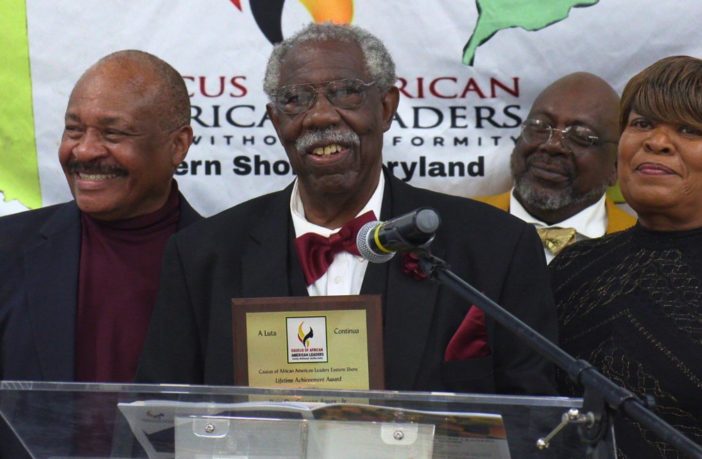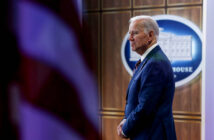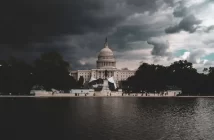By Stephen Janis and Taya Graham,
Special to the AFRO
On Maryland’s Eastern Shore, the landscape is replete with reminders of the peninsula’s racist past.
The Harriet Tubman center sits astride the pathways she navigated to guide slaves to freedom. Signs point to the birthplace of Frederick Douglass, whose seminal book “Narrative of the Life of Frederick Douglass, an American Slave” recounted the harrowing tale of his early life on a local plantation.
But, on Oct. 14 at the Caucus of African American Leaders Eastern Shore award banquet in Salisbury the theme of the night was not the past, but the present. It was a moment when many of the attendees andhonorees conveyed a message of hope that progress was not only possible, but palpable.
“What I see tonight is hope,” said the Rev. James Jones, convener of the Caucus and organizer of the event. “What I see are people working to make lives better for all of us, day in and day out. What I see ischange.”
Among the attendees were tangible signs of that progress Jones noted.
Foremost was the first Black mayor of Pocomoke, Todd Nock, who was elected to the city’s top job earlier this year.
In opening remarks Nock told the assemblage of roughly 200 guests that he was not the only pioneering officeholder in an area where Black elected officials used to be rare. He pointed to Chrisfield’s Mayor Darlene Taylor and Hurlock’s Rev. Charles T. Cephas Sr. as examples of change, noting they all took office recently.
“We now have three Black mayors on the Eastern Shore; two years ago we didn’t have any,” said Nock, whose rapid rise from activist to mayor was the subject of the documentary “The Friendliest Town.”
Keynote speaker State Del. J. Sandy Bartlett also celebrated the election of Maryland’s first Black governor, Wes Mooore, who took office in 2023.
She noted that along with the governor, the Speaker of the House of Delegates Adrian Jones was another sign of what she called “good news.”
“I challenge you to share good news every day. I challenge you to bring solutions,” she said. “At the very least listen to solutions brought to you.”
The Caucus of African American Leaders Eastern Shore held its second awards banquet on Oct. 14 in Salisbury, Md., where they honored trailblazers and community leaders making a difference for African Americans on the Eastern Shore. (Photo courtesy of Facebook)
Along with a recognition of progress in the increasing number of Black officer holders, the evening highlighted local residents who had worked for or contributed to the increase in equity at the ballot box.
One of those honorees was a woman who was never elected to public office but led the way for change by running.
Roberta Butler ran for an at-large council seat in Federalsburg multiple times, unsuccessfully. However, her efforts called attention to a voting process that had systematically excluded African Americans from winning office. The city made all council candidates run citywide. That process meant a town which is nearly half African-American had never elected a Black councilperson.
Earlier this year, a landmark lawsuit filed by the ACLU on behalf of Butler and other Black residents led to a judge ruling that Federalsburg was in violation of the Voting Rights Act. The judge ordered the city to create single-member council districts instead of the at-large districts, and two Black council members were elected earlier this year.
Butler received the “Unsung Hero” award at the banquet for her effort, along with a standing ovation.
“None of this would have happened without her courage,” Jones said.
Other honorees included: Worcester County NAACP President Edward S. Lee, Talbot County Schools Superintendent Sharon Pepukayi and Dorchester County Orphans Court’s chief judge, the Rev. Dr. George R. Ames, who received a lifetime achievement award and said the ceremony was a recognition of the ongoing fight for justice.
“We are fighting to keep that history going and moving forward,” Ames said.
Despite the optimistic tone of the evening, convener of the state Caucus of African Americans Leaders Carl Snowden said the success of the present needed to be the foundation for the future as new challenges emerged. Among them, he said, was an upcoming presidential election that could irreparablyalter the path of civil rights for decades to come.
“We are on the eve of the most consequential election of our lifetime. We have to catalyze African-American voters like their lives depended on it,” he said. “Because it does.”
Awards:
Rev. Charles Bagley – Unsung Hero Award
Roberta Butler – Unsung Hero Award
Eugenie “Shanie” Shields – Unsung Hero Award
James Yamakawa – Unsung Hero Award
John Queen – Unsung Hero Award
Del. Sheree Sample-Hughes (D) – Trailblazer Award
Clayton Washington – Lifetime Achievement Award
Dr. Sharon Pepukayi – Trailblazer Award
Rev. Dr. George R. Ames Jr. – Lifetime Achievement Award
Betty Johnson – Lifetime Achievement Award
Authors note: The reporters produced the documentary “The Friendliest Town”



